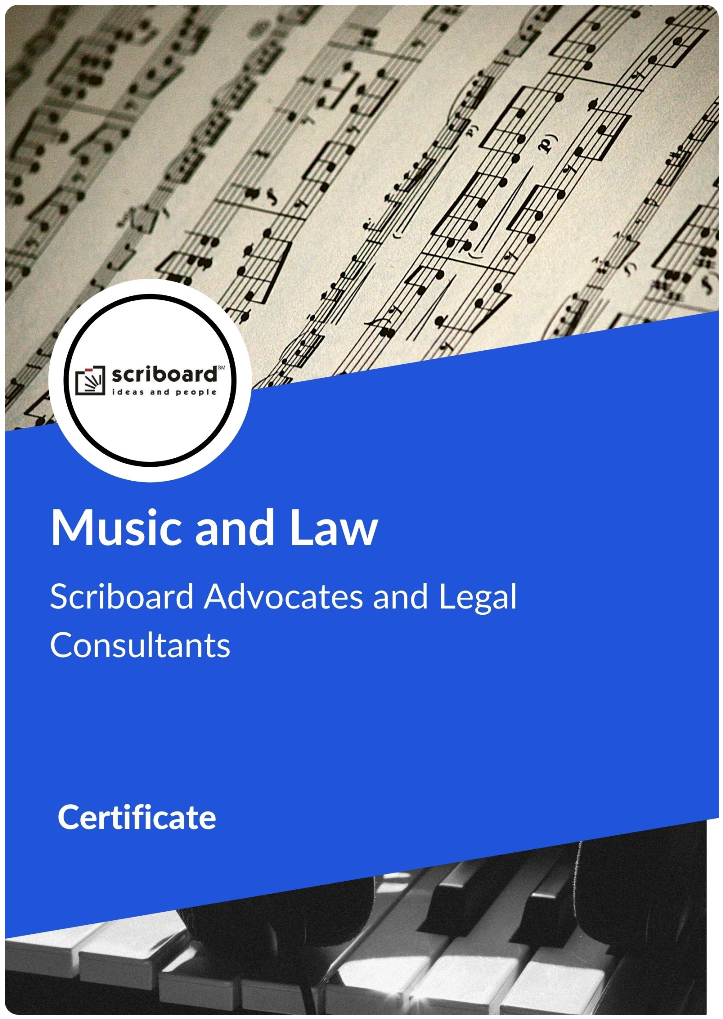Enrol for Lifetime Deal Course and get Access to 100+ Certificate Courses at INR 5999
Enrol for a Master Course at INR 3999 and get access to multiple Certificate Courses
Enrol for a Diploma Course at INR 2999 and get two free Certificate Courses
Enrol for a Certificate Course at INR 1999 and get one free Certificate Course

₹4,999.00 Original price was: ₹4,999.00.₹1,999.00Current price is: ₹1,999.00.
When we talk about ‘music’, what instantaneously crosses your thoughts? Song albums, melodies, chorales, anthems, hymns, lullabies, opera, and other audio compositions. Like any other aspect, law has its implication on the music industry as well. The term ‘Music Law’ refers to the intersection of law and music. This intersection ranges from issues involving contracts, copyright, trademark, music publishing, endorsement agreements, licensing etc. Any person who wishes to pursue his/her career in music must understand these legal implications as well. The Certificate in Music and Law is brought to you by one of the eminent law firms in India, Scriboard Advocates and Legal Consultants, in association with Enhelion. It aims to analyse the relationship of music and the law vis-à-vis music as a medium of expression. It further examines the applicability of intellectual property law in the music industry and discusses the important clauses of endorsement and artist agreement.
According to the law firm and our policy, the course fees will not be refunded.
WHAT WILL SET YOU APART?
Enrolling for the certificate programme will enable you to:
The course has been designed to provide a detailed understanding of how law and music interact in the modern time. Ranging from downloads, streaming, music publishing and licensing to the rights of live performers, the course touches upon the commercial as well as intellectual property aspects which from an integral part of the music industry.
The following modules will be covered under the course-

Rodney D. Ryder is the founding partner at Scriboard and is a leading technology, intellectual property and corporate lawyer. He is the author of Guide to Cyber Laws: the Information Technology Act, 2000, E-Commerce, Data Protection and the Internet, the first section-wise analysis of the Indian Information Technology Act, 2000. He is presently Advisor to the Ministry of Communications and Information Technology, Government of India on the implementation of the Information Technology Act, 2000.Mr. Ryder has been nominated as a 'Leading Lawyer' in intellectual property, technology, communications and media law by Asia Law, Who'sWhoLegal, Asia Legal 500, amongst other International publications. Mr. Ryder is also advisor to the Data Security Council of India [a NASSCOM initiative] on the structuring of industry data privacy and information security policies and contractual standards. His second book, Intellectual Property and the Internet, published by LexisNexis is perhaps the only one of its kind in Asia. The text has been acknowledged to be an authoritative work by the Hon’ble Supreme Court of India and has been quoted in the first and only judgement by the Hon’ble Supreme Court of India on domain names. He is advisor to the National Internet Exchange of India [NiXI] and a member of the panel of independent and neutral arbitrators with NiXI.
In every walk of life, the process of evaluation takes place in one form or the other. If the evaluation process is eliminated from human life then perhaps the aim of life may be lost. Being in the same line, Enhelion is committed to evaluate the process of learning through its courses.
The evaluation will be conducted in a two-fold manner. There will be one MCQ test which would test the basic understanding on the topics covered in the course. Furthermore, there will be one Project Assignment, which would test the analytical understanding of the same.
The most intriguing aspect of the evaluation process is the time flexibility it affords. You can take the MCQ test and submit the project assignment as per your convenience.
To be eligible to receive a certificate after successful completion of the course, one is required to secure a minimum of 40 percent overall.
